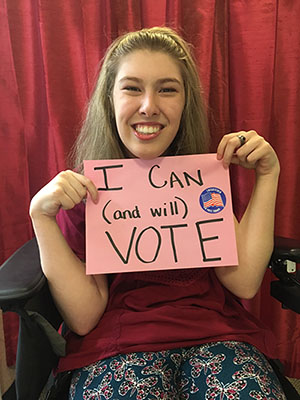Voting and Guardianship in Oklahoma
February 24, 2021

|
Sooner Success of Oklahoma held its annual Statewide Caregivers Conference on November 5th and 12th, 2020. It was held virtually this year due to Covid restrictions. There were many sessions available in this conference, but I especially enjoyed Mr. Ballard's presentation on guardianship in Oklahoma. The topic of voting rights and guardianship are a very important topic in Oklahoma right now. Nancy Ward, who is a nationally known self-advocate and others have been working with the Oklahoma Disability Law Center to ensure that those who need some guardianship do not lose their basic civil rights, most of all voting. Several legislators have seen the impact guardianship laws have made when it comes to voting and bills are being introduced in hopes of change. You can see more of Nancy's story here: https://youtu.be/ai5UPNolmsU
I was able to attend several sessions of the conference, but this particular session was very detailed and informative. I appreciate Mr. Ballard's care in provided good, relevant, and concise information on the topic of Guardianship. In my experience, While my daughter was young, I was always told that I would need to look into guardianship. When I took Partners In Policymaking, it became clear to me that guardianship was not the right option for our family. Even though I felt well educated on guardianships, I learned so much from Mr. Ballard's presentation. I learned new information that was presented so clearly. I feel that every family should hear about guardianship from Mr. Ballard so that they are fully aware of the types of guardianship and what it means for their family/situation.
The very first thing he stated is that "guardianship involves the loss of fundamental rights". Including civil and constitutional rights. He caught my attention right away. He said it should be used as a last resort and not taken lightly. He expressed that the individual should still be allowed in the decision making process, however the decision is fully in the hands of those given guardianship.
Guardianship is a legal relationship set up by a judge. A guardian can be a person, institution, or agency appointed by the courts to manage affairs and interests of an individual. It should be tailored to meet each individual's needs and allow them to continue to make as many decisions as they are able. Guardianship is a serious decision because it limits a personal choice of where to live, their finances, health and medical care, and supports receives. It transfers the persons rights of autonomy to another person and lasts until that person (now considered a ward) dies, the court modifies the order, or the individuals rights are restored.
Very interesting quote from Claude Pepper, US Representative in Florida on "Abuses in Guardianship":
"The typical ward has fewer rights than a convicted felon ... It is, in one short sentence, the most punitive civil penalty that can be levied against an American citizen, with the exception ... of the death penalty."
Because of the legal implication to a person's civil rights, guardianship must be recognized as an extraordinary intervention.
4 Types of Guardianship in Oklahoma:
- Special - for emergency situation, limited to 30 days, extended by court order, authority over one issue
- Limited - for individuals who are partly incapacitated, guardian may only have authority over the person, the person's property, or both the person and property, can be limited to just certain areas within these categories
- General - this type of guardianship is more desirable when appropriate, limits the guardian's authority to specific areas while allowing the ward to maintain certain rights that would be lost under a general guardianship (Voting, Serve as a Juror, Operate a Motor Vehicle, hold a professional license, be an organ donor, receive hospice, etc.) These rights are not automatically obtained. They must be requested and written into the order.
- Temporary - can be of the person, property or both and considered incapacitated by the court for a period of time.
Primary role of guardian is decision making. As the decision maker they have the following responsibilities:
- Follow the order of the court
- Protect the remaining rights of the ward
- Develop a close relationship with the ward
- Know the capabilities, physical and mental health, and finances of the ward
- Promote, encourage and respect the ward's rights to be involved in all decisions affecting his/her life
Much time was taken to express that the individual be allowed to make as many personal decisions as they are able. And to the maximum possible extent to protect their individual rights. It was expressed that a guardian take their role seriously and to know the ward well enough to make decisions that reflect their desires. In the end, it is the guardian's decision, but the individual should be allowed to participate and the decision should absolutely represent their desires. Persons with a guardian should always be allowed to decide what to eat and wear, how they spend leisure time, and who they have relationships with. The guardian should never have authority over these preferences.
Guardianships are almost impossible to modify or terminate, so much research should be done before creating a guardianship. The loss of civil and constitutional rights alone should be a deterrent. I understand that for some guardianship is needed, but any alternatives should always be considered first.
This was a very informative segment. The topic was interesting and very clearly shared with conference participants. Power Points shared were relevant and very clearly showcased the information given. I would encourage others to take the time to watch this segment on guardianship.
- Mr. Ballard's Presentation: https://youtu.be/IqSwZYm2oro|
- A Handbook for Guardians: http://oklahomafamilynetwork.org/wp-content/uploads/2018/04/Amber-McConnell-Guardianship-Handbook.pdf
- Local news with Nancy Ward: https://www.koco.com/article/center-works-to-make-sure-oklahomans-with-disabilities-have-the-chance-to-vote/34541411#







